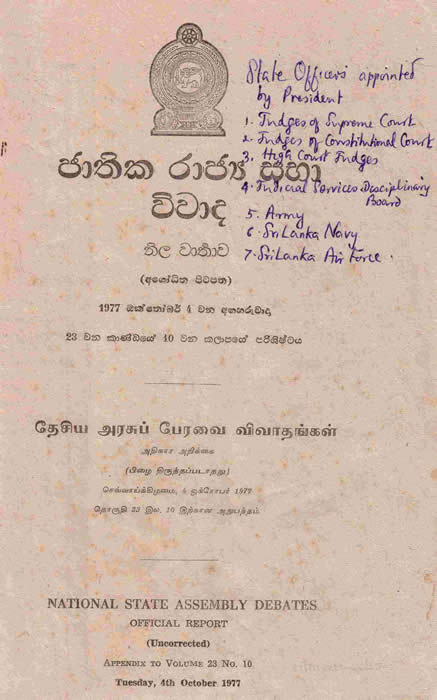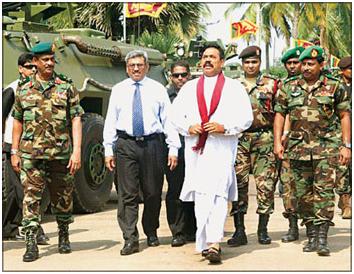Ilankai Tamil Sangam30th Year on the Web Association of Tamils of Sri Lanka in the USA |
||||
 Home Home Archives Archives |
Ethnic Cleansing in the Sri Lankan Armed ForcesSrimavo Bandaranaike’s legacyby Sachi Sri Kantha, April 18, 2011
Last year, in my remembrance feature on Visvanather Dharmalingam (1918-1985), the Federal Party MP from 1960 to 1983, [that appeared on October 24, 2010 in this website] I noted, “Luckily, for future Tamil chroniclers (like me), in collaboration with his FP colleague V.N. Navaratnam, ‘Dharmar’ had bequeathed a valuable document (via parliament) in 1977, which in the current context, is a state secret.” Here are the details about this document. One can assume that after the landmark victory of the UNP over the previous Sirimavo Bandaranaike-led regime in the July 1977 general election, the two TULF veterans V.N. Navaratnam and V. Dharmalingam combined their talents to place on the parliamentary record the planned ethnic cleansing of Tamils in Sri Lanka. They stealthily formulated a question, and solicited an answer to it from J.R. Jayewardene, the then Prime Minister and Minister of Defence, Minister of Planning & Economic Affairs and Minister of Plan Implementation. The question was captioned “State Officers appointed by the President.” The question was, as it appeared in the records of the National State Assembly Debates Official Report,
J.R. Jayewardene answered the question by tabling a 32-page document (which in the current context) would probably be ‘a state secret’. This material appeared as an Appendix to the National State Assembly Debates Official Report of 4th October 1977 Tuesday. At that time, I subscribed to these debates and, with foresight, I have preserved this document, which provides vital details of the then active,
The cover of this document appears as follows:
For this short commentary, I’ll focus only on the Sri Lankan armed forces officers, especially the Army. The officers, numbered from 1 to 426, were recruited from October 1949 to December 20, 1976. The vital statistics of 12 SL army commanders, who confronted LTTE (from 1976 to 2009) are provided here. I’ll highlight here only those officers (army, navy and air force) who were recruited in the aftermath of the April 5, 1971 JVP insurgency, from April 5 to December 31, 1971. A pdf file compiled by me is provided in the following attachment: Recruits to SL Armed Forces post April 1971 pdf For convenience, I have summarized the data only into five columns: the rank number, name, date of birth, commencement of original service, and academic or professional qualifications. Where the details are unclear for individuals (army rank number 295 to 299 in the document, due to smudging in the print copy), I have inserted a ‘?’ mark. In Sri Lankan society, it is possible to identify an ethnic individual (with a few marginal exceptions carrying Portuguese-derived names like Fernando) by the family name.
The Army recruited 56 ‘State officers appointed by the President’. Among these, 54 were Sinhalese. No Tamils. Two (one Muslim and one Malay) were minorities. The Navy recruited 6. Among these 4 were Sinhalese. One Tamil, and One Muslim. The Air Force recruited 3. All three were Sinhalese. Have a look at the 54 Sinhalese ‘State Officers appointed by the President’ who were recruited in April and July 1971. Three names are recognizable.
Their academic qualifications, when they were recruited were GCE (Ordinary Level), i.e., 10 years of schooling. The fact that Gotabhaya Rajapaksa commenced his army service on April 26, 1971 (at the age of 21 years and 10 months, and merely three weeks after the commencement of JVP insurgency!) may indicate that his status as the younger sibling of rookie SLFP MP from the troubled South and ‘patronage politics’ aided him tremendously in his hiring. Among the 56 ‘State Officers appointed by the President’ who were recruited to the army between April and December 1971, only two had higher qualification above the GCE(Ordinary Level). While one had GCE (Advanced Level), the other one had BA (Arts) degree. This itself tells something about the cerebral quality of that particular batch! What a dandy document this 1977 list of ‘State Officers appointed by the President’ is! One can study the discriminatory, ethnic cleansing recruitment policies of Sinhalese governments, from 1960 to 1977. One can study the education qualification of recruits to the SL army, navy and air force. One can also use it as an authentic document for Sinhalese onomastics study (the discipline devoted to the study of names) in the 20th century Sri Lanka. |
|||
|
||||

